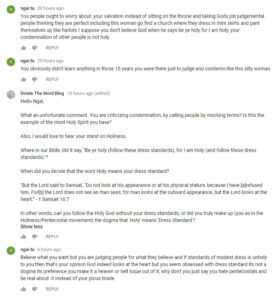I always felt like I was being a little dishonest in my days as a legalist when I spoke of the rules and regulations of the faith I belonged to, particularly in trying to explain them to new converts or questioning prospects. Our ladies weren’t allowed to cut their hair, color their hair, trim their hair, perm their hair, wear short sleeve shirts, tights/leggings, wear metal of any kind in their hair, or any form of jewelry/ornamentation, etc.
The same rules applied to me, as a man, with other requirements as well, such as abstaining from facial hair or allowing my hair to grow past a few inches long. And when people questioned these, saying things like, ‘Sounds like you guys are still under the Old Testament law,’ the response was always, “No, it isn’t laws, they are standards.”
To illustrate this, I want to start off with pics (pictures prove I haven’t altered the text in any way) from two exchanges I’ve had with people on YouTube content in the past week.
In both cases, we are discussing the Oneness (Apostolic) Pentecostal Holiness movement, of which I was part of for 15 years, and their dogmas (standards) on dress. I won’t take the time to reiterate all of those things, but read these blog posts to learn more: Men and Womens Apparel in Ancient Days, The Commandments of Men, & Out of Context: Without Holiness No Man Shall See The Lord.
In both cases, the individuals are defending their church dress standards, but claim things that aren’t true, and then do what I used to do, and that is to be dishonest about what the ‘standards’ really are. These are Oneness Pentecostals responding to my videos and other videos on the same topic – dress standards being law.

This one is one of the more interesting conversations because this individual does what most Apostolic Pentecostals do. He/She initially relates their dress standards to the commandment of being “Holy,” and then declares that the only other side to the coin (in layman terms) is that you’ll just go wear mini-skirts and paint your face, which makes you a harlot. (Yes, the Apostolic Pentecostal church teaches that you can’t wear makeup and make it to heaven.)
This highlights the disease of this belief set – because it gets rooted in their heart that if you don’t dress like them, you are a harlot.
Then of course, when asked how they make the connection between ‘Be ye holy, for I am holy,’ and ‘Without Holiness, no man shall see the Lord’ and their dress rules, he/she says what I used to say.
“It’s not a dogma its preference you make it a heaven or hell issue out of it.’
That baffles me because it is actually the Apostolic Pentecostals making a heaven/hell issue out of it. In a recent conversation with a young man, he said, “Look, they are standards, not laws, and the local pastor has the right to set standards for his church. (even on things not taught in the Bible, so long as they don’t contradict the Bible) I went and talked to the pastor and even he admitted, these things like facial hair, short sleeve vs long sleeve shirts are not heaven or hell issues.”
That sounded good, but then the pastor said this, (this is not verbatim, but accurate) “But, if I set the standard here, and you don’t obey me, you are sinning the sin of disobedience.”
That my friend is a law.

This one became even more interesting and this is just a small portion of the whole conversation. What always intrigues me about these ‘defenders of the faith’ is how rude and arrogant they tend to get.
All at once, Carson declares that women in the 1st century would have worn dresses like we would think of a dress today, as completely different from a man’s clothing, that the Apostle Paul taught this very simple idea, attempts to use Greek words to prove that women wore dresses, intently implies anyone who doesn’t believe this lacks basic intelligence (in another post, Carson said, “If you struggle with this simple principle you must struggle with a lot of things in life lol,”) and then goes on to say, “I dont believe a woman is going to hell because of pants.”
This is just a sampling of the fervor you will find defending the dress standards of the Apostolic Pentecostal faith. So I did a little social sampling/research, asking questions like this one.
“The Bible says not to take away from, or add to the Word. Jesus made it clear in Mark 7:7 that men who created their own laws (let’s call them standards) for the people, things outside of God’s word, were hypocrites and that worshiping Jesus in those things was vain and useless. Nowhere in Scripture does it say the Pastor has the right and duty to make up his own church rules, required for membership, that are outside of Scripture, and we aren’t talking about carpet color and instrument selection.
So, if your pastor says that men wearing facial hair is unholy – would I be allowed to be a full-fledged member of the church if I continued to wear facial hair? Would I be allowed to be a member? Would God be able to use me? Could I participate, in Choir, outreach, etc.?”
The answer, of course, is no. Unless you abide by that pastor’s standards, you have no legal standing in the Faith. So then I ask this question, “If there is no other Apostolic church in this town, and I can’t be a member of yours, how can I be saved since the majority of Apostolic Pentecostals think they are the only saved people on the earth?”
What is the difference between a Standard and a Law?
 A law is something that is written into statutes that all people must obey. Disobedience to these laws results in penalization. In this simple example, the white background speed limit sign is a posted law. If you exceed this limit, you can be subject to penalties including traffic violations and fines. Normally (In the U.S.) you’ll have to appear before a judge and defend or plead your case. You are sentenced from your infraction and you pay the fine or duty that the judge imposes on you. That is how law works.
A law is something that is written into statutes that all people must obey. Disobedience to these laws results in penalization. In this simple example, the white background speed limit sign is a posted law. If you exceed this limit, you can be subject to penalties including traffic violations and fines. Normally (In the U.S.) you’ll have to appear before a judge and defend or plead your case. You are sentenced from your infraction and you pay the fine or duty that the judge imposes on you. That is how law works.
 The yellow background speed sign is a standard. It is an advisory speed sign. You’ll normally see this when coming into a space of road that has a lot of curves or is windy. They will post a sign that is the suggested speed for which it is safest to drive that stretch of road. Exceeding this limit may place you in danger of not handling the road well, but it is not a traffic law violation to exceed this speed. If you are doing 35mph in a 25mph advisory zone, you have broken no laws and will not be judged for your behavior.
The yellow background speed sign is a standard. It is an advisory speed sign. You’ll normally see this when coming into a space of road that has a lot of curves or is windy. They will post a sign that is the suggested speed for which it is safest to drive that stretch of road. Exceeding this limit may place you in danger of not handling the road well, but it is not a traffic law violation to exceed this speed. If you are doing 35mph in a 25mph advisory zone, you have broken no laws and will not be judged for your behavior.
This highlights the simplistic distinction between Law and Standard.
You see, while we/they can claim that the standards of the Apostolic Holiness movement are not laws, they (and I was this way) are being very dishonest. I know people who defend these standards in this fashion who are not intentionally being dishonest, in fact, most aren’t, they are just regurgitating what they are being fed from the pulpit.
People will say, ‘Our dress standards are not laws,’ and yet, they will in the pulpit (and I’ve heard it hundreds of times) say, “No woman wearing pants and lipstick is going to make it to heaven.” In the first conversation image I posted, these people always backlash when you question their standards, by saying things like, “Fine, go find your self a church where you can be a harlot (wear makeup).”
If something you do keeps you out of heaven, it is because you have violated God’s law. So if the claim is, ‘You can’t go to heaven if you aren’t obeying the standards,’ then you know assuredly, that those are laws, not standards.
Now, a church and pastor may make a standard, something like, “Our church has held the standard that we do not want any married men or women in a room alone with another married person. When I (The pastor) counsel, I will not do it alone with a woman, my standard is to always have my wife with me when I counsel someone of the opposite sex. We ask all of our church members to be careful in this way.”
This is a standard. This is something based in principle, that you are not judged for, that you are not legislated by, and your membership to the church does not depend on. Would following the example set before you be extremely wise? Absolutely! but it is not a law.
God alone, if you believe in God and in His Word, is the only one capable of creating laws. Those laws were written. The faith was once (and for all) delivered unto the saints. What is going to keep you out of the Kingdom of God was clearly written in Scripture. To add to that is such a dangerous thing.
Conclusion
Let me end by saying this: If you, for yourself, believe that wearing a certain piece of clothing, or worshiping at a certain time helps keep you closer to God, than by all means, do it.
The faith which you have [that gives you freedom of choice], have as your own conviction before God [just keep it between yourself and God, seeking His will]. Happy is he who has no reason to condemn himself for what he approves.” – Romans 14:22, AMP
I am not judging you, or anyone for the personal standards and convictions they want to keep. Paul made it clear that you are blessed (happy) for those things you allow. Your own personal convictions.
What I am coming against, is entire organizations making ‘standards’ that keep people in or out of the church, and to their set of beliefs, also keep people in or out of heaven. If it wasn’t written in Scripture, and it’s taught as something you must do, it is a man-made law and should be called for what it is, an error and fallacy.
They worship Me in vain [their worship is meaningless and worthless, a pretense],
Teaching the precepts of men as doctrines [giving their traditions equal weight with the Scriptures].’ – Mark 7:7
********
Shop at our Amazon store! As an Amazon Influencer, this website earns from qualifying purchases.





